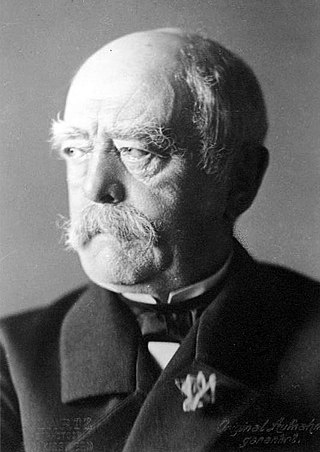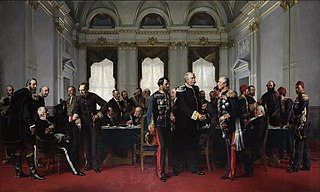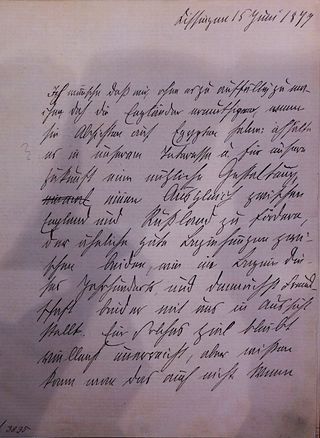
The Dual Alliance was a defensive alliance between Germany and Austria-Hungary, which was created by treaty on October 7, 1879, as part of Germany's Otto von Bismarck's system of alliances to prevent or limit war. The two powers promised each other support in case of attack by Russia. Also, each state promised benevolent neutrality to the other if one of them was attacked by another European power. Bismarck saw the alliance as a way to prevent the isolation of the German Empire, which had just been founded a few years before, and to preserve peace, as Russia would not wage war against both empires.

The German Empire, also referred to as Imperial Germany, the Second Reich or simply Germany, was the period of the German Reich from the unification of Germany in 1871 until the November Revolution in 1918, when the German Reich changed its form of government from a monarchy to a republic.

Otto, Prince of Bismarck, Count of Bismarck-Schönhausen, Duke of Lauenburg was a Prussian and later German statesman and diplomat. Bismarck's Realpolitik and powerful rule led to him being called the Iron Chancellor.

The Triple Alliance was a defensive military alliance between Germany, Austria-Hungary, and Italy. It was formed on 20 May 1882 and renewed periodically until it expired in 1915 during World War I. Germany and Austria-Hungary had been closely allied since 1879. Italy was looking for support against France shortly after it lost North African ambitions to the French. Each member promised mutual support in the event of an attack by any other great power. The treaty provided that Germany and Austria-Hungary were to assist Italy if it was attacked by France without provocation. In turn, Italy would assist Germany if attacked by France. In the event of a war between Austria-Hungary and Russia, Italy promised to remain neutral.

Georg Leo Graf von Caprivi de Caprara de Montecuccoli was a German general and statesman who served as the chancellor of the German Empire from March 1890 to October 1894. Caprivi promoted industrial and commercial development, and concluded numerous bilateral treaties for reduction of tariff barriers. However, this movement toward free trade angered the conservative agrarian interests, especially the Junkers. He promised educational reforms to the Catholic Center party which would increase their influence, but failed to deliver. As part of Kaiser Wilhelm's "new course" in foreign policy, Caprivi abandoned Bismarck's military, economic, and ideological cooperation with the Russian Empire, which historians consider a major mistake. Even worse, Caprivi misjudged multiple opportunities to open good relations with the United Kingdom of Great Britain and Ireland. Frustrated, Britain turned to the Empire of Japan and the French Third Republic for agreements. Caprivi's downfall came with trade agreements that favored German industry and urban workers over more powerful agricultural interests. Historians praise his refusal to renew the harsh restrictions on socialists, and his success in the reorganization of the German military.

The Treaty of Berlin was signed on 13 July 1878. In the aftermath of the Russian victory against the Ottoman Empire in the Russo-Turkish War of 1877–1878, the major powers restructured the map of the Balkan region. They reversed some of the extreme gains claimed by Russia in the preliminary Treaty of San Stefano, but the Ottomans lost their major holdings in Europe. It was one of three major peace agreements in the period after the 1815 Congress of Vienna. It was the final act of the Congress of Berlin and included Great Britain and Ireland, Austria-Hungary, France, Germany, Italy, Russia and the Ottoman Empire. Chancellor of Germany Otto von Bismarck was the chairman and dominant personality.

The Triple Entente describes the informal understanding between the Russian Empire, the French Third Republic, and the United Kingdom of Great Britain and Ireland. It was built upon the Franco-Russian Alliance of 1894, the Entente Cordiale of 1904 between France and Britain, and the Anglo-Russian Entente of 1907. It formed a powerful counterweight to the Triple Alliance of the German Empire, the Austro-Hungarian Empire, and the Kingdom of Italy. The Triple Entente, unlike the Triple Alliance or the Franco-Russian Alliance itself, was not an alliance of mutual defence.

The Congress of Berlin was a diplomatic conference to reorganise the states in the Balkan Peninsula after the Russo-Turkish War (1877–1878), which had been won by Russia against the Ottoman Empire. Represented at the meeting were Europe's then six great powers: Russia, Great Britain, France, Austria-Hungary, Italy, and Germany; the Ottomans; and four Balkan states: Greece, Serbia, Romania and Montenegro. The congress concluded with the signing of the Treaty of Berlin, replacing the preliminary Treaty of San Stefano that had been signed three months earlier.
The League of the Three Emperors or Union of the Three Emperors was an alliance between the German, Russian and Austro-Hungarian Empires, from 1873 to 1887. Chancellor Otto von Bismarck took full charge of German foreign policy from 1870 to his dismissal in 1890. His goal was a peaceful Europe, based on the balance of power. Bismarck feared that a hostile combination of Austria-Hungary, France, and Russia would crush Germany. If two of them were allied, then the third would ally with Germany only if Germany conceded excessive demands. The solution was to ally with two of the three. In 1873 he formed the League of the Three Emperors, an alliance of the Kaisers of Germany and Austria-Hungary and the Tsar of Russia. Together they would control Eastern Europe, making sure that restive ethnic groups such as the Poles were kept in control. It aimed at neutralizing the rivalry between Germany's two neighbors by an agreement over their respective spheres of influence in the Balkans and at isolating Germany's enemy, France. The Balkans posed a more serious issue, and Bismarck's solution was to give Austria predominance in the western areas, and Russia in the eastern areas.

The Franco-Russian Alliance, also known as the Dual Entente or Russo-French Rapprochement, was an alliance formed by the agreements of 1891–94; it lasted until 1917. The strengthening of the German Empire, the creation of the Triple Alliance of 1882, and the exacerbation of Franco-German and Russo-German tensions at the end of the 1880s led to a common foreign policy and mutual strategic military interests between France and Russia. The development of financial ties between the two countries created the economic prerequisites for the Russo-French Alliance.

Under Tsar Nicholas II, the Russian Empire slowly industrialized while repressing opposition from the center and the far-left. During the 1890s Russia's industrial development led to a large increase in the size of the urban middle class and of the working class, which gave rise to a more dynamic political atmosphere. Because the state and foreigners owned much of Russia's industry, the Russian working class was comparatively stronger and the Russian bourgeoisie comparatively weaker than in the West.

The identification of the causes of World War I remains a debated issue. World War I began in the Balkans on July 28, 1914, and hostilities ended on November 11, 1918, leaving 17 million dead and 25 million wounded. Moreover, the Russian Civil War can in many ways be considered a continuation of World War I, as can various other conflicts in the direct aftermath of 1918.
Splendid isolation is a term used to describe the 19th-century British diplomatic practice of avoiding permanent alliances, particularly under the governments of Lord Salisbury between 1885 and 1902. The concept developed as early as 1822, when Britain left the post-1815 Concert of Europe, and continued until the 1902 Anglo-Japanese Alliance and the 1904 Entente Cordiale with France. As Europe was divided into two power blocs, Britain became aligned with the French Third Republic and the Russian Empire against the German Empire, Austria-Hungary and the Kingdom of Italy.

The Bulgarian Crisis refers to a series of events in the Balkans between 1885 and 1888 that affected the balance of power between the Great Powers and the conflict between Austria-Hungary and the Russian Empire. It was one of several episodes in the continuing Balkan Crisis as vassal states struggled for independence from the Ottoman Empire but achieved a mosaic of nascent nation-states (Balkanisation). They featured unstable alliances that frequently led to war and eventually to the First World War.

France–Russia relations, also known as Franco-Russian relations or Russo-French relations, have seldom been friendly.
The Mediterranean Agreements were a series of treaties signed in 1887 by the United Kingdom of Great Britain and Ireland with Italy on 12 February, with Austria-Hungary on 24 March and with Spain on 4 May. Further notes were exchanged between Britain, Italy and Austria-Hungary on 12 December.

This article covers worldwide diplomacy and, more generally, the international relations of the great powers from 1814 to 1919. This era covers the period from the end of the Napoleonic Wars and the Congress of Vienna (1814–1815), to the end of the First World War and the Paris Peace Conference (1919–1920).

The Kissingen Dictation is a diplomatic file created in Bad Kissingen by the German Chancellor Otto von Bismarck during the summer of 1877. It contains the principles of his foreign policy.
The history of German foreign policy covers diplomatic developments and international history since 1871.

France entered World War I when Germany declared war on 3 August 1914.














